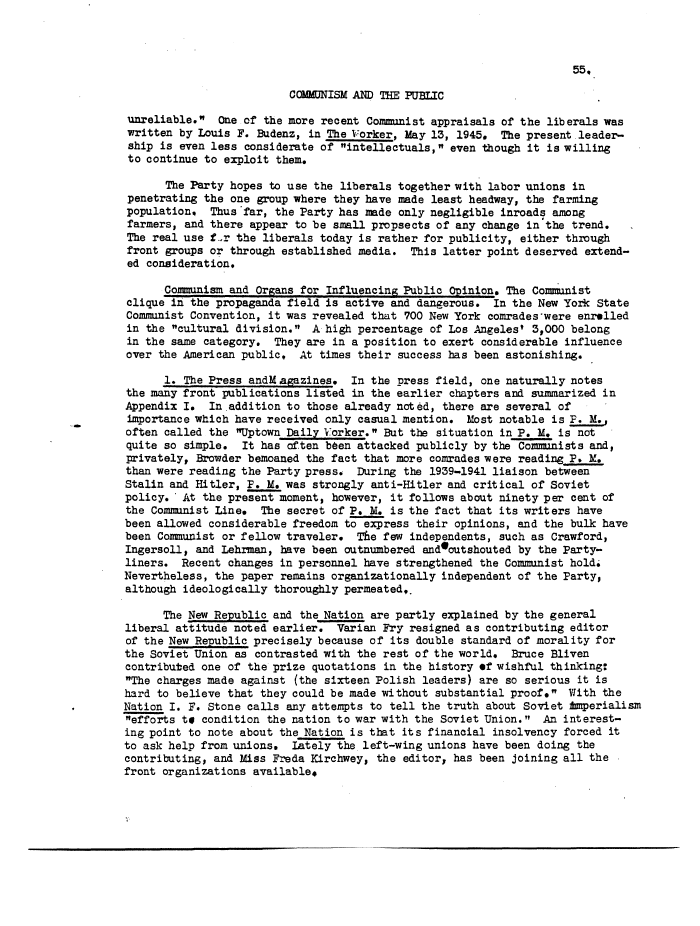 |
||||
 |
||||
| 55, COMMUNISM AND THE PUBLIC unreliable." One of the more recent Communist appraisals of the liberals was written by Louis F. Budenz, in The Vrorker. May 13, 1945, The present leader- ship is even less considerate of "intellectuals,n even though it is willing to continue to exploit them. The Party hopes to use the liberals together with labor unions in penetrating the one group where they have made least headway, the farming population. Thus 'far, the Party has made only negligible inroads among farmers, and there appear to be small propsects of any change in'the trend. The real use t..r the liberals today is rather for publicity, either through front groups or through established media. This latter point deserved extend- ed consideration, Communism and Organs for Influencing Public Opinion, The Communist clique in the propaganda field is active and dangerous* In the New York State Communist Convention, it was revealed that 700 New York comrades'were enrolled in the "cultural division," A high percentage of Los Angeles' 3,000 belong in the same category. They are in a position to exert considerable influence over the American public, At times their success has been astonishing* 1. The Press andM agazines. In the press field, one naturally notes the many front publications listed in the earlier chapters and summarized in Appendix I, In.addition to those already noted, there are several of importance which have received only casual mention* Most notable is F. M,, often called the "Uptown Daily Vorker.n But the situation in P. M, is not quite so simple. It has of.ten been attacked publicly by the Communists and, privately, Browder bemoaned the fact that more comrades were reading P» M, than were reading the Party press. During the 1939-1941 liaison between Stalin and Hitler, F. M, was strongly anti-Hitler and critical of Soviet policy, ' At the present moment, however, it follows about ninety per cent of the Communist Line. The secret of P, M, is the fact that its writers have been allowed considerable freedom to express their opinions, and the bulk have been Communist or fellow traveler. The few independents, such as Crawford, Ingersoll, and Lehrman, have been outnumbered and^outshouted by the Party- liners* Recent changes in personnel have strengthened the Communist hold. Nevertheless, the paper remains organizationally independent of the Party, although ideologically thoroughly permeated,. The New Republic and the Nation are partly explained by the general liberal attitude noted earlier. Varian Fry resigned as contributing editor of the New Republic precisely because of its double standard of morality for the Soviet Union as contrasted with the rest of the world, Bruce Bliven contributed one of the prize quotations in the history «f wishful thinking: "The charges made against (the sixteen Polish leaders) are so serious it is hard to believe that they could be made without substantial proof." With the Nation I. F. Stone calls any attempts to tell the truth about Soviet imperialism "efforts tf condition the nation to war with the Soviet Union." An interest- ing point to note about the Nation is that its financial insolvency forced it to ask help from unions. Lately the left-wing unions have been doing the contributing, and Miss Freda Kirchwey, the editor, has been joining all the front organizations available* |